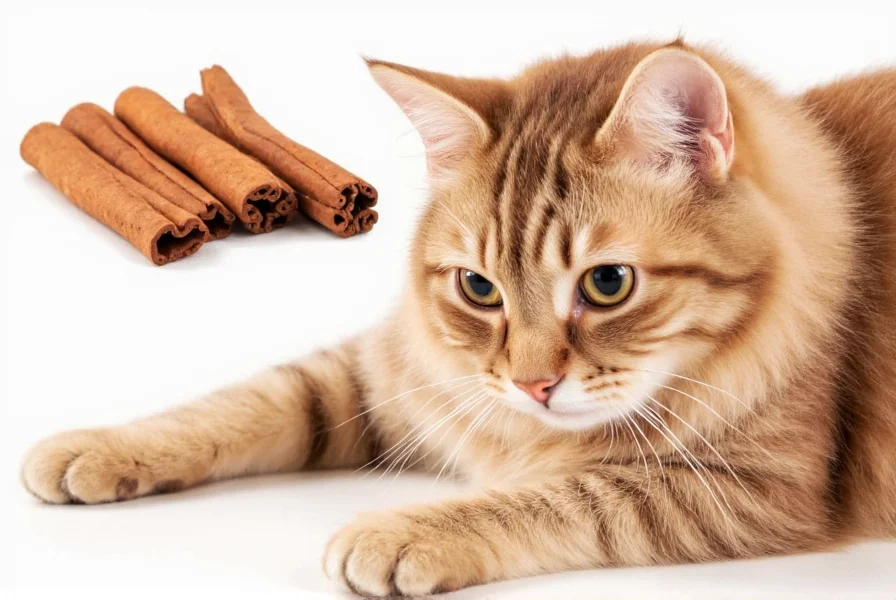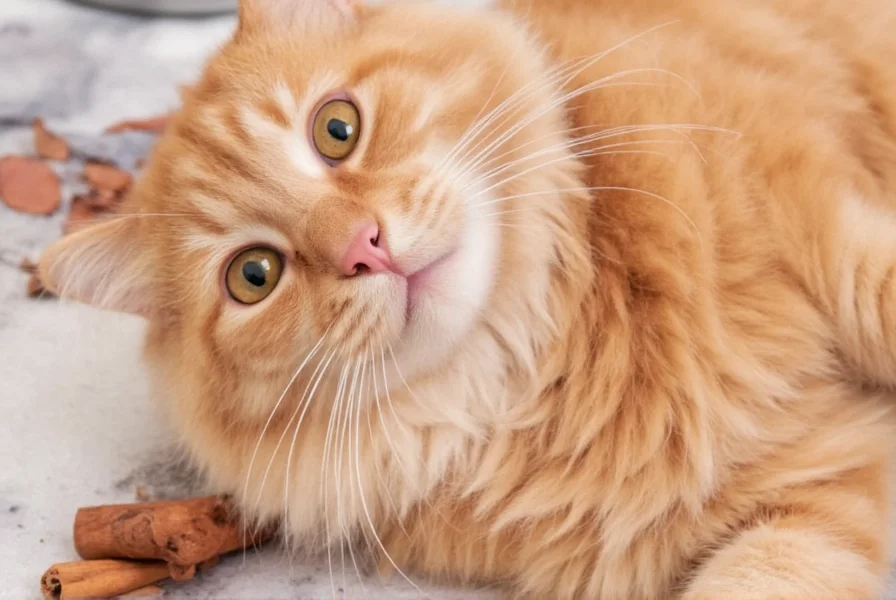As a pet owner, understanding the potential dangers of common household substances is crucial for your cat's safety. Cinnamon, a popular spice found in many kitchens, requires careful handling around feline companions. This article provides science-based information about cinnamon's effects on cats, helping you make informed decisions to protect your pet.
Why Cinnamon Poses Risks to Cats
Cats have a unique physiology that makes them particularly sensitive to certain compounds found in cinnamon. The primary concern comes from cinnamaldehyde, the compound responsible for cinnamon's distinctive flavor and aroma. Unlike humans and dogs, cats lack sufficient glucuronyl transferase enzymes in their livers to properly metabolize this compound and other components in cinnamon.
When cats ingest cinnamon or are exposed to cinnamon essential oils, they can experience:
- Respiratory irritation when inhaling cinnamon powder
- Gastrointestinal upset including vomiting and diarrhea
- Liver toxicity from metabolizing cinnamaldehyde
- Low blood sugar levels (hypoglycemia)
- Changes in heart rate
Cinnamon Exposure: Forms and Risks
Not all cinnamon exposures carry equal risk. Understanding the different forms helps assess potential danger:
| Form of Cinnamon | Risk Level | Common Exposure Scenarios |
|---|---|---|
| Culinary ground cinnamon | Moderate | Spills, baked goods, cooking areas |
| Cinnamon sticks | Low to Moderate | Decorative displays, potpourri |
| Cinnamon essential oil | Severe | Aromatherapy, cleaning products, DIY remedies |
| Cinnamon-scented products | Variable | Candles, air fresheners, household cleaners |
Cinnamon essential oil represents the greatest danger due to its concentrated nature. Even diffusing cinnamon oil can cause respiratory distress in cats. The ASPCA Animal Poison Control Center considers essential oils particularly hazardous for felines.
Symptoms of Cinnamon Toxicity in Cats
If your cat has been exposed to cinnamon, watch for these symptoms of potential toxicity:
- Excessive drooling or pawing at the mouth
- Vomiting and diarrhea
- Difficulty breathing or wheezing
- Lethargy or weakness
- Low body temperature
- Increased heart rate
- Redness or irritation on skin (with direct contact)
Severe cases of cinnamon essential oil dangers for cats may lead to liver damage, which might not show immediate symptoms but can become apparent days later through jaundice (yellowing of gums and eyes) and continued lethargy.
What to Do If Your Cat Ingests Cinnamon
If you suspect your cat has consumed cinnamon or been exposed to cinnamon products:
- Remove remaining cinnamon from your cat's reach
- Wipe mouth gently with a damp cloth if recently ingested
- Do not induce vomiting unless directed by a veterinarian
- Contact your veterinarian immediately or an animal poison control center
- Provide details about what, how much, and when exposure occurred
For what happens if cats eat cinnamon scenarios, prompt veterinary attention significantly improves outcomes. Your vet may recommend supportive care, fluid therapy, or other treatments depending on the severity of exposure.
Preventing Cinnamon Exposure
Prevention remains the best approach for cat cinnamon exposure symptoms avoidance:
- Store spices securely in closed cabinets away from curious cats
- Avoid using cinnamon-scented candles or diffusers in homes with cats
- Be cautious with DIY cleaning products containing essential oils
- Keep baked goods containing cinnamon out of reach
- Supervise cats in kitchen areas during cooking
- Choose pet-safe alternatives for household products

Safe Alternatives for Cat Owners
When seeking aromatic alternatives that won't harm your feline companion, consider these safe spices for cats options:
- Catnip (Nepeta cataria) - specifically for feline enjoyment
- Valerian root - often used in cat toys
- Wheatgrass or oat grass - safe for cats to nibble
- Plain, unscented household products
Always consult with your veterinarian before introducing any new substances to your cat's environment, even those considered generally safe.
When to Seek Veterinary Care
While minor exposure to culinary cinnamon might only cause temporary discomfort, certain situations require immediate veterinary attention:
- Exposure to cinnamon essential oil in any amount
- Difficulty breathing after inhaling cinnamon powder
- Persistent vomiting or diarrhea lasting more than 2 hours
- Signs of lethargy or weakness
- Known ingestion of large quantities
Early intervention is critical for effective cinnamon toxicity treatment for cats. Your veterinarian can provide appropriate supportive care to minimize potential complications.
Understanding Feline Metabolism
The reason cats face greater risks from cinnamon than humans stems from their unique metabolic pathways. Unlike humans, cats lack certain liver enzymes (specifically glucuronyl transferases) needed to process phenolic compounds like those found in cinnamon. This metabolic difference explains why substances safe for humans can be toxic to cats.
Research published in the Journal of Feline Medicine and Surgery confirms that cats' inability to properly metabolize certain compounds makes them vulnerable to plant-based toxins that might only cause mild reactions in other species. This physiological reality underscores why is ground cinnamon toxic to cats requires serious consideration from pet owners.
Final Considerations
While cinnamon isn't among the most dangerous household toxins for cats, it shouldn't be considered safe either. The potential for respiratory irritation, gastrointestinal upset, and liver complications means pet owners should exercise caution. Keeping cinnamon products securely stored and avoiding cinnamon-scented products creates a safer environment for your feline companion.
Remember that individual cats may react differently to cinnamon exposure based on age, health status, and the specific form and amount of exposure. When in doubt about can cats be around cinnamon, err on the side of caution and consult your veterinarian for personalized advice.
Is a small amount of cinnamon dangerous for cats?
A very small amount of culinary cinnamon, like what might be found in a baked treat, typically causes only mild, temporary gastrointestinal upset in cats. However, even small amounts can irritate their respiratory system if inhaled as powder. While not usually life-threatening in tiny quantities, it's best to avoid intentional exposure.
What should I do if my cat licked cinnamon?
If your cat licked a small amount of culinary cinnamon, wipe their mouth gently with a damp cloth and monitor for symptoms like drooling, vomiting, or respiratory distress. Contact your veterinarian if symptoms develop or if you're concerned. For cinnamon essential oil exposure, seek immediate veterinary care regardless of the amount.
Can cats be in the same room as diffused cinnamon oil?
No, cats should not be in rooms where cinnamon essential oil is being diffused. Essential oils are highly concentrated and can cause severe respiratory irritation, liver damage, and neurological symptoms in cats. The ASPCA strongly advises against using essential oil diffusers around cats due to their sensitive respiratory systems and unique metabolism.
How long do cinnamon toxicity symptoms last in cats?
Most mild symptoms from culinary cinnamon exposure (like vomiting or drooling) typically resolve within 12-24 hours with supportive care. However, symptoms from essential oil exposure or significant ingestion may last longer and require veterinary treatment. Liver-related symptoms might not appear immediately but could develop over several days following exposure.
Are cinnamon sticks safe for cats?
Cinnamon sticks pose less immediate risk than powdered cinnamon or essential oils, but they're not completely safe. Cats could potentially chew on them, leading to mouth irritation or gastrointestinal upset. Additionally, broken pieces could present a choking hazard. It's best to keep all forms of cinnamon out of reach of curious cats.











 浙公网安备
33010002000092号
浙公网安备
33010002000092号 浙B2-20120091-4
浙B2-20120091-4